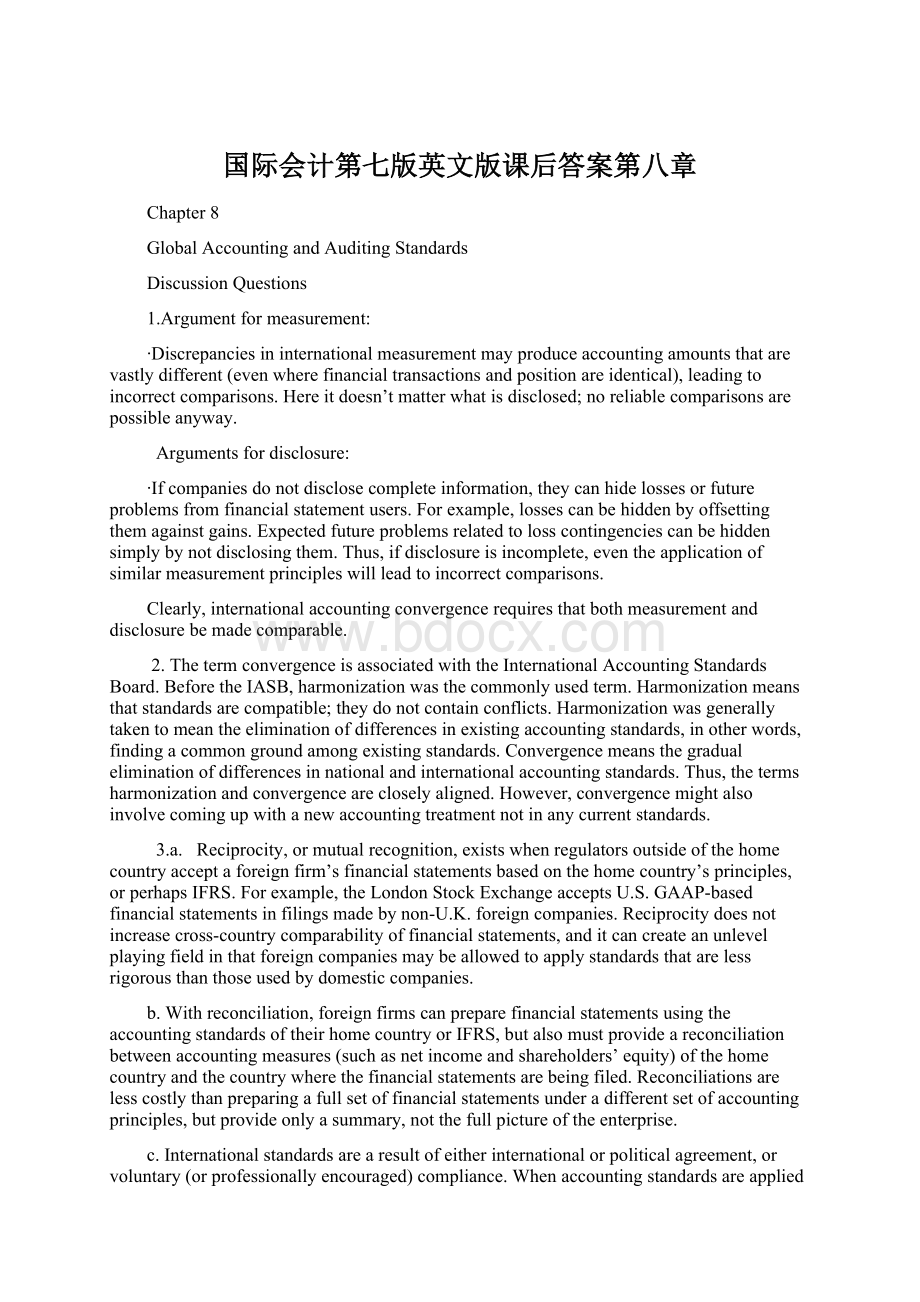国际会计第七版英文版课后答案第八章.docx
《国际会计第七版英文版课后答案第八章.docx》由会员分享,可在线阅读,更多相关《国际会计第七版英文版课后答案第八章.docx(18页珍藏版)》请在冰豆网上搜索。

国际会计第七版英文版课后答案第八章
Chapter8
GlobalAccountingandAuditingStandards
DiscussionQuestions
1.Argumentformeasurement:
∙Discrepanciesininternationalmeasurementmayproduceaccountingamountsthatarevastlydifferent(evenwherefinancialtransactionsandpositionareidentical),leadingtoincorrectcomparisons.Hereitdoesn’tmatterwhatisdisclosed;noreliablecomparisonsarepossibleanyway.
Argumentsfordisclosure:
∙Ifcompaniesdonotdisclosecompleteinformation,theycanhidelossesorfutureproblemsfromfinancialstatementusers.Forexample,lossescanbehiddenbyoffsettingthemagainstgains.Expectedfutureproblemsrelatedtolosscontingenciescanbehiddensimplybynotdisclosingthem.Thus,ifdisclosureisincomplete,eventheapplicationofsimilarmeasurementprincipleswillleadtoincorrectcomparisons.
Clearly,internationalaccountingconvergencerequiresthatbothmeasurementanddisclosurebemadecomparable.
2.ThetermconvergenceisassociatedwiththeInternationalAccountingStandardsBoard.BeforetheIASB,harmonizationwasthecommonlyusedterm.Harmonizationmeansthatstandardsarecompatible;theydonotcontainconflicts.Harmonizationwasgenerallytakentomeantheeliminationofdifferencesinexistingaccountingstandards,inotherwords,findingacommongroundamongexistingstandards.Convergencemeansthegradualeliminationofdifferencesinnationalandinternationalaccountingstandards.Thus,thetermsharmonizationandconvergencearecloselyaligned.However,convergencemightalsoinvolvecomingupwithanewaccountingtreatmentnotinanycurrentstandards.
3.a.Reciprocity,ormutualrecognition,existswhenregulatorsoutsideofthehomecountryacceptaforeignfirm’sfinancialstatementsbasedonthehomecountry’sprinciples,orperhapsIFRS.Forexample,theLondonStockExchangeacceptsU.S.GAAP-basedfinancialstatementsinfilingsmadebynon-U.K.foreigncompanies.Reciprocitydoesnotincreasecross-countrycomparabilityoffinancialstatements,anditcancreateanunlevelplayingfieldinthatforeigncompaniesmaybeallowedtoapplystandardsthatarelessrigorousthanthoseusedbydomesticcompanies.
b.Withreconciliation,foreignfirmscanpreparefinancialstatementsusingtheaccountingstandardsoftheirhomecountryorIFRS,butalsomustprovideareconciliationbetweenaccountingmeasures(suchasnetincomeandshareholders’equity)ofthehomecountryandthecountrywherethefinancialstatementsarebeingfiled.Reconciliationsarelesscostlythanpreparingafullsetoffinancialstatementsunderadifferentsetofaccountingprinciples,butprovideonlyasummary,notthefullpictureoftheenterprise.
c.Internationalstandardsarearesultofeitherinternationalorpoliticalagreement,orvoluntary(orprofessionallyencouraged)compliance.Whenaccountingstandardsareappliedthroughpolitical,legal,orregulatoryprocedures,statutoryrulestypicallygoverntheprocess.Allotherinternationalstandardseffortsinaccountingarevoluntaryinnature.
4.KeyrationalessupportingthedevelopmentandwidespreadapplicationofIFRSinclude:
a.Agrowingbodyofevidenceindicatesthatthegoalofinternationalconvergenceofaccounting,disclosureandauditinghasbeenwidelyaccepted.
b.Alldimensionsofaccountingarebecomingconvergedworldwide.
c.IncreasingnumbersofhighlycredibleorganizationsstronglysupportthegoalsoftheIASB.
d.Nationaldifferencesintheunderlyingfactorsthatleadtovariationinaccounting,disclosure,andauditingpracticesarenarrowingascapitalandproductmarketsbecomemoreinternational.
e.Internationalstandardswillimprovethecomparabilityofinternationalfinancialinformation.
f.Timeandmoneywillbesavedoninternationalconsolidations,thecomponentsofwhichnowaresubjecttodifferentnationallawsandpractices.
g.Theremaybeatendencyforaccountingstandardsthroughouttheworldtoberaisedtothehighestpossiblelevel.
h.WidespreadapplicationofIFRSmightalsoresultin:
∙Improvedmanagerialdecisionmakingwithinmultinationalenterprises.
∙Improvedallocationsofcorporateinvestmentmoneyworldwide.
∙Betterinternationalunderstandabilityoffinancialstatements.
∙Costreductionsinaccountinginformationprocessingandfinancialdisclosurecostsformultinationalenterprises.
∙Greaterinternationalcredibilityforpublishedfinancialstatements.
5.KeyrationalesagainstthedevelopmentandwidespreadapplicationofIFRSinclude:
a.Accountinghasbuilt-inflexibility.Itsabilitytoadapttowidelydifferentsituationsisoneofitsmostimportantfeatures.Criticsdoubtthatinternationalstandardscanbeflexibleenoughtohandledifferencesinnationalbackgrounds,traditions,andeconomicenvironments,andmaybeapoliticallyunacceptablechallengetosovereignty.
b.Itisclaimedthatinternationalaccountingstandardsettingisatacticofthelargeinternationalaccountingservicefirmstoexpandtheirmarketshare.
c.Internationalstandardsmaycreatestandardsoverloadforcompaniesthatdobusinessinternationally.
d.Nationalpoliticalconcernsfrequentlyintrudeonaccountingstandards.Internationalpoliticalinfluenceswouldcompromiseinternationalaccountingstandards.
e.Internationalstandardsarenotsuitableforsmallandmedium-sizedcompanies,particularlyunlistedoneswithnopublicaccountability.
f.Risksofmisinformation—uniformstandardsmaygivetheappearanceofsimilaritieswheninfactcountriesandcompaniesmaybehighlydissimilar.
g.PoliticalcostsofthenecessaryinternationaltreatiesonfinancialaccountingandreportingwhichwouldhavetobenegotiatedtoenforcetheuseofIFRS.
6.EvidenceindicatingwideacceptanceofIFRSaroundtheworld:
a.GrowingnumbersofcompaniesareadoptingIFRSvoluntarilyandrefertotheiruseofIFRSintheirannualreports.
b.DozensofcountriesbasetheirnationalaccountingstandardsonIFRS.
c.Some7,000EUlistedcompaniesnowuseIFRSintheirconsolidatedfinancialstatements.
d.Manyinternationalorganizations,suchasIOSCO,endorsetheuseofIFRS.
e.IFRSareusedasaninternationalbenchmarkinmanymajorindustrializedcountries.
f.IFRSareacceptedbymanystockexchangesandsecuritiesregulators.
g.IFRSarerecognizedbytheEuropeanCommission(EC)andothersupranationalbodies.
h.NorwalkAgreementcommittedFASBandIASBtoconvergence.
7.TheInternationalAccountingStandardsBoardisoverseenbytheInternationalAccountingStandardsCommittee,consistingof22trustees:
sixfromNorthAmerica,sixfromEurope,sixfromtheAsia-Pacificregion,andfourfromanyarea.ThetrusteesappointthemembersoftheIASB.TheIASBreceivesadvicefromtheStandardsAdvisoryCouncilonitsagendaandpriorities.TheSACconsistsofaround30membersappointedbytheIASCtrusteesandtheyrepresentadiversityofgeographicandprofessionalbackgrounds.
TheIASBconsistsof14members,12full-timeandtwopart-time.Itfollowsadueprocessinsettingaccountingstandards.Foreachstandard,theboardnormallypublishesadiscussionpaperthatsetsoutthevariouspossiblerequirementsforthestandardandtheargumentsforandagainsteachone.Later,theboardpublishesanexposuredraftforpubliccomment,anditthenexaminestheargumentsputforwardinthecommentprocess.Afinalstandardisissuedwhennineofthe14boardmembershavevotedinitsfavor.
8.AccountingharmonizationintheEUisjustoneelementoftheoverallprojectofharmonizingthelegalandeconomicsystemsofthememberstates,andispartoftheprocessofharmonizingcompanylaw.
TheFourthDirectiveillustratestheconceptofharmonization,andspecifiesaccountingmeasurement(valuation)anddisclosurerequirements.Itprovidesformatrulesforthebalancesheetandtheprofitandlossaccount.Thetrueandfairviewistheoverridingrequirementandholdsforfootnotedisclosuresaswellasthefinancialstatements.TheFourthDirectivealsosetsouttherequirementsforfinancialstatementaudits.
TheSeventhDirectiveaddressesconsolidatedfinancialstatements.Itrequiresconsolidationsforgroupsofcompaniesaboveacertainsize,specifiesdisclosuresandnotes,andrequiresadirectors’report.Whenitwasissuedin1983,consolidatedfinancialstatementsweretheexceptionratherthantheruleinEurope.
TheEighthDirectiveaddressedvariousaspectsofthequalificationsofprofessionalsauthorizedtocarryoutlegallyrequired(statutory)audits.NowreferredtoastheStatutoryAuditDirective,itwassubstantiallyamendedin2006.Thenewdirectivetightensoversightoftheauditprofessionandhasstandardsfor,amongotherpoints,auditorappointmentandrotation,andcontinuingprofessionaleducation.
TheEUabandoneditsapproachtoharmonizationtoonefavoringtheIASBforpracticalandpoliticalreasons.TheFourthandSeventhDirectiveswereincompleteandessentiallyremainedastheywereissued.Improvementstothemproveddifficulttoachieveandthedirectivesdidnotachievethecomparabilityexpected.SomesawasetofEurope-widestandardsasanunnecessaryredundancygiventheemergenceofcomprehensiveIFRS.OtherssawU.S.GAAPasarivaltoIFRS.TheEUcannotinfluenceU.S.GAAP,butcaninfluenceIFRS.ByputtingitsweightbehindtheIASB,theEUcouldserveasacounterweighttoU.S.GAAP.
9.Internationalaccountingharmonization/convergenceshouldaddressmany,ifnotmost,investorconcernsaboutcross-nationaldifferencesinaccountingpractices.Thekeyissuehereiscomparability–investorswanttomake“applestoapples”comparisonsoffinancialstatementsofcompaniesfromcountriesaroundtheworld.However,converg